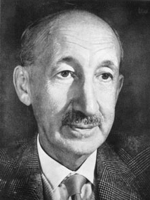
1943 Nobel Prize in Chemistry
Georg von Hevesy (*1885 – †1966) received the Nobel Prize for his work on the use of isotopes as tracers in the study of chemical processes.
Georg von Hevesy, born in 1885 in Budapest, studied at the universities of Budapest, Berlin, and Freiburg, where he received his PhD in 1908 with a dissertation on physical chemistry. He then worked in Karlsruhe under Haber und in Manchester under Rutherford, where he was introduced to the latest methods and concepts in nuclear physics and nuclear chemistry. In Vienna he conducted experiments with Paneth that used radioactive methods to determine the solubility of sparingly soluble salts. After World War I he worked at Niels Bohr’s institute in Copenhagen, where he and Dirk Costner discovered the element hafnium using x-ray fluorescence.
From 1926 to 1934 von Hevesy served as professor for physical chemistry at the University of Freiburg. In these years he continued his work on x-ray fluorescence, for example as a means of determining the age of minerals, and began studies on the implementation of radioactive indicators in biochemistry and physiology. Being of Jewish descent, he left Germany in 1934 as a result of the political developments following the Nazis’ seizure of power.
Von Hevesy remained active until 1961, first in Copenhagen and later in Stockholm. In this later phase of his career, he began focusing more on biochemical, physiological, and medical topics, which he studied with the help of radioactive isotopes.
Von Hevesy received numerous scientific awards and honorary degrees, including an honorary doctorate from the University of Freiburg. He conducted pioneering work in the field of x-ray fluorescence and laid the foundations for the use of radioactive isotopes as indicators in biology and medicine. He is regarded as the father of molecular medicine. He received the Nobel Prize in Chemistry in 1943 for his development of isotope tracing. Von Hevesy saw himself as a Freiburger: He studied here, was a professor here, and two of his children were born here. One of his daughters lives in Freiburg. He died in Freiburg on 5 July 1966.







